Student Blog
Admissions
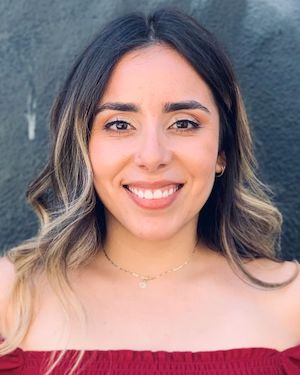
The USC U don’t C ⟩
April 21, 2022, by Silvia
Admissions Community Diversity First-Gen Getting Involved
No todo es color de rosa. Like my friend Rolly says, “There is a USC that you don’t see.”
Holistic admissions? I love it. I am all in for decreasing barriers and increasing access for students to enter spaces of higher education. Do you know the percentage of Latinx individuals in higher education? There is not many of us, but that is changing. We are changing it.
As the new director of admissions, Dr. Anvarizadeh and her team pushed for a holistic process that would view applicants as whole individuals—considering their core values, thoughts about equity, diversity, and inclusion, etc. — and not just as a set of test scores or GPAs. Let me tell you why this has been a game changer, but more importantly, why the work can not stop only with holistic admissions.
⋯
In 2018, I graduated from Cal Poly SLO with my first collegiate degree. The time that I had to rejoice in that feeling of being the first in my family to graduate college was short lived as my dad would be losing his job shortly after. I was quickly reminded of my role and my identity as a Mexican daughter, the eldest child in a family of eight. My educational and career goals were put on pause because as I was raised, in my Mexican culture, family comes before and is above everything. Naturally embracing that role, I texted my brothers to figure out how we were going to pull through, like we always do.
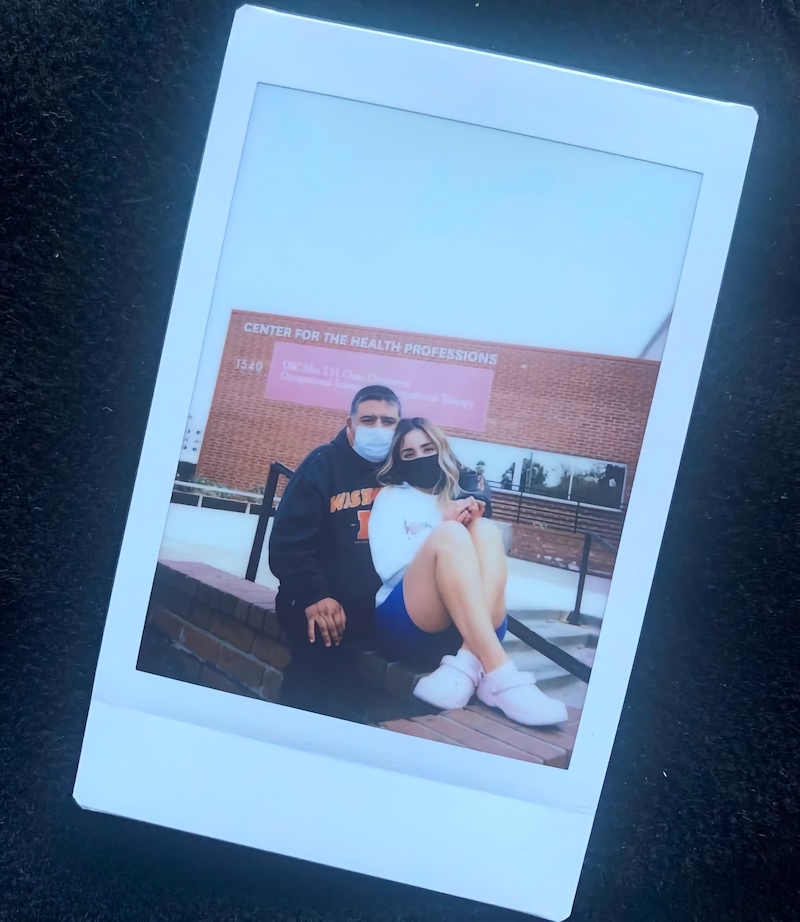
Mi papá y yo at CHP
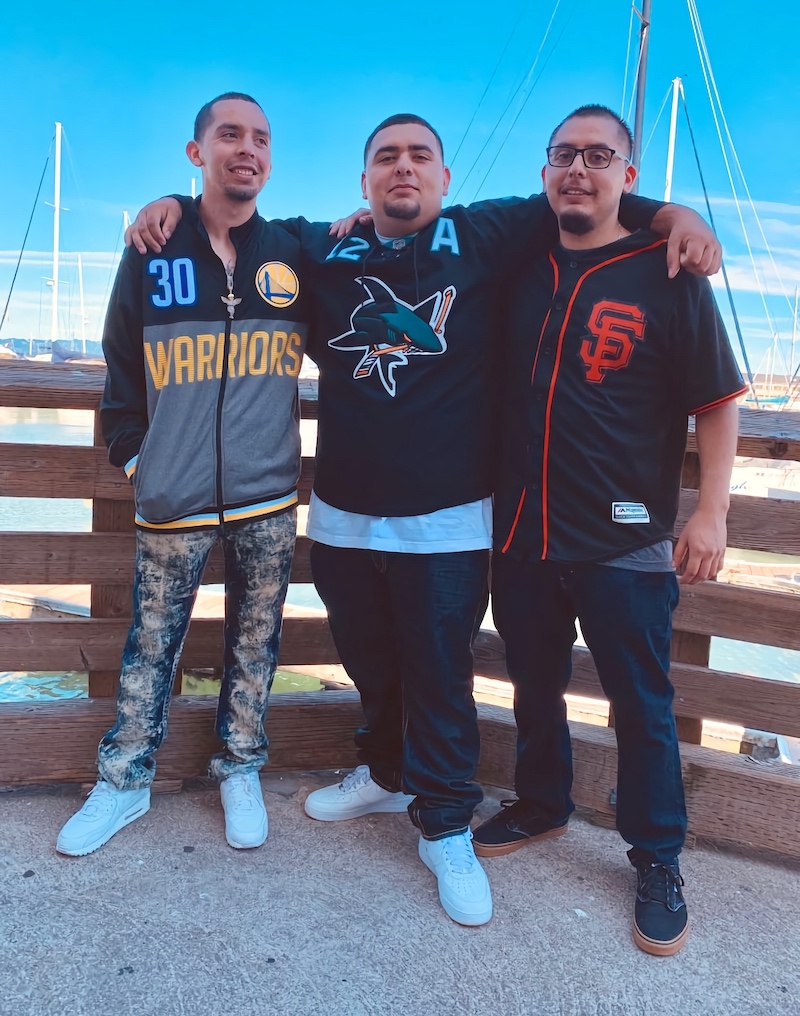
My 4Lifers, mis hermanos
For the next year or so, I worked Monday-Sunday and gave my dad more than half of my paycheck. When I began considering the possibility of furthering my education and applying to graduate school, I felt guilty. I felt selfish. How could I be thinking about myself and what I wanted when my dad was still not 100% back on his feet? It is ironic because even the decision of going back to school was based on helping my parents. I needed this degree to be able to get a job in my field of interest and so that I could earn more money to give back to my family. That is how collectivist cultures like mine work.
The thought of resuming my role and identity as a student was great, but with what money and what time? What money was I able to save for grad school? What money did I have to spare to take the GRE more than once or to spend on study materials, for that matter? What time did I have to sit for a 4-hour exam more than once? I didn’t. Talk about the barriers that USC Chan’s holistic admissions addressed for me. In my application video I stated the occupations that got me through the difficult time my family faced: work and prayer.
That is my story, but I write this blog to highlight the fact that there are stories behind the BIPOC students being admitted into the program that you do not see. Holistic admissions have opened the door for us to be able to step into higher spaces, but to quote my friend Miriam De La Torre, “don’t invite us into the room if there is not a seat at the table open for us.” You see the faces and numbers that represent diversity but are ignorant to the adversity attached to them. If the work is not to be performative, we cannot continue to casually disregard that the “E” in the new JEDI curriculum stands for equity vs. equality. You can’t allow us into the room to watch us stand. Students need to be supported beyond admission.
Se tenía que decir y se dijo.
All this to say that many of us BIPOC student and allies are here to keep the momentum going to make sure we continue to do the work past holistic admissions. Like Dr. Anvarizadeh said at COTAD’s “Springing into Action” virtual event, we cannot do this in silo — we have to lock arms to see it through. I hope y’all are ready for what is to come as we continue to collaborate, work together, and build community.
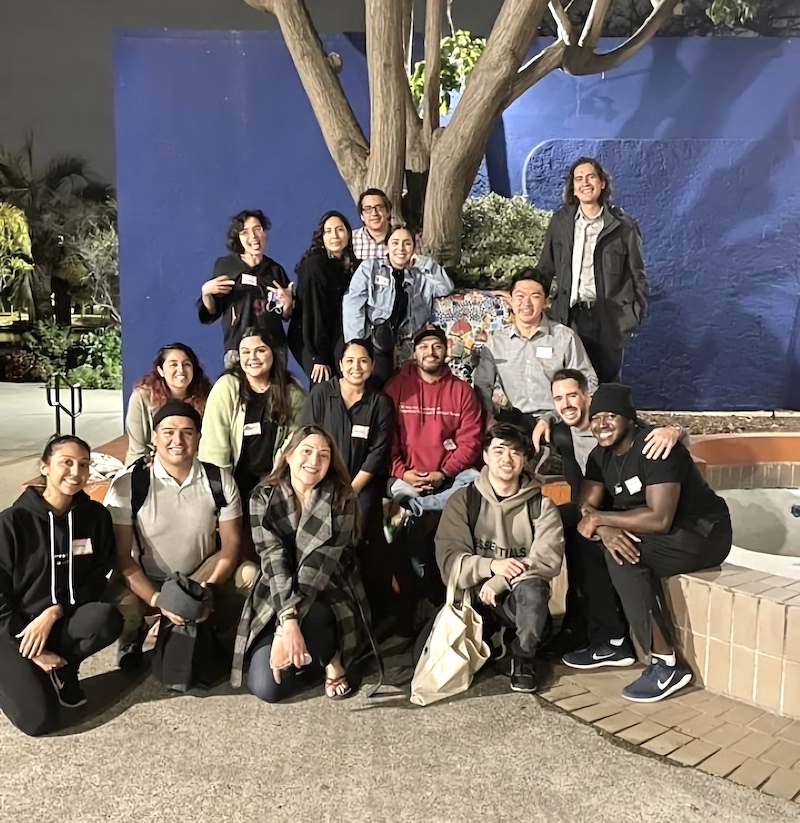
Showing up for each other: Students attend an event at Plaza de La Raza for which Dr. Diaz was a panelist
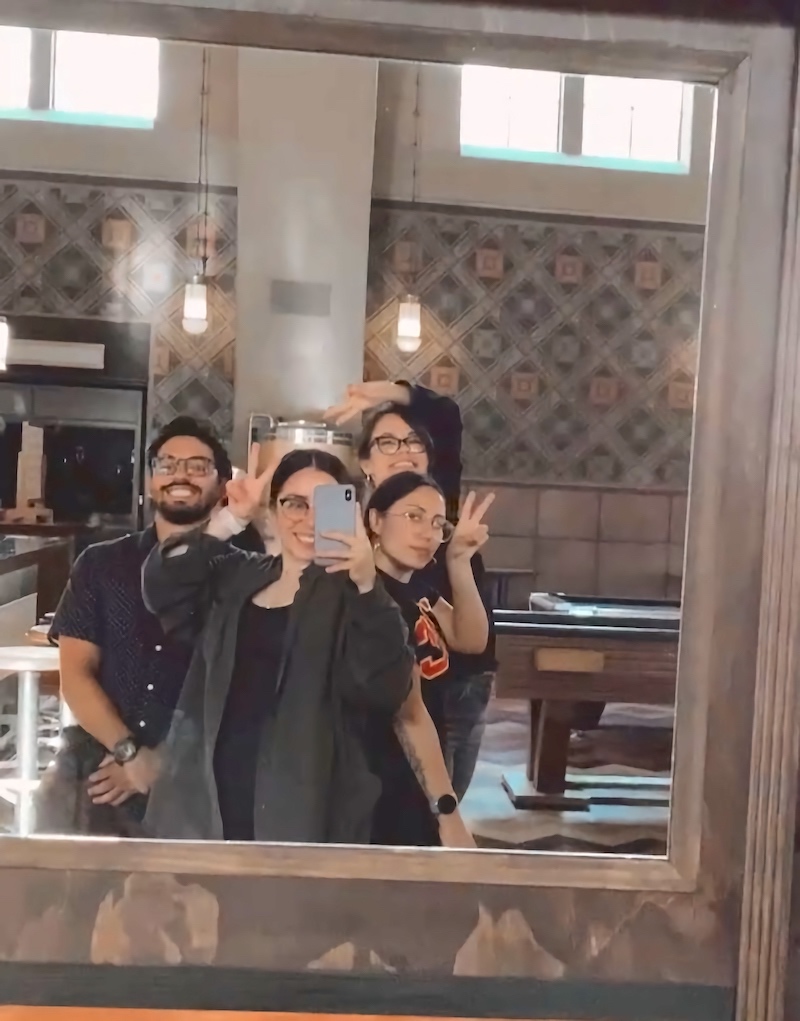
Mis amig@s y yo at one of our AHTO social events: Abraham Ramirez, Daniela Flores-Madriaga, Denisse Mendoza
⋯
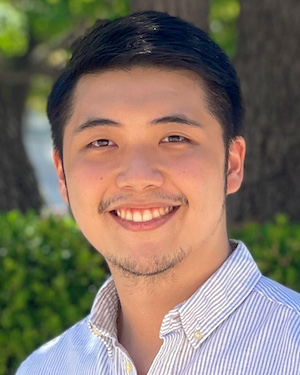
A Letter to the Future International Students ⟩
April 5, 2022, by Marvyn
Admissions Community International
Hello there!
If you are reading this blog, you are either a current student (whom by no means I coerced to read LOL), you are aspiring to become a student of USC Chan, or you are already on your way to becoming one. Wherever you may be in your life, I encourage you to read on.
Allow me to tell you this: Being a part of the USC Chan community is genuinely a life-changing opportunity. I am not saying this just because I am a student ambassador, but I am genuine when I say that my experience at USC Chan has been so enriching and filled with countless, irreplaceable memories. If you have been following all my blog posts, I have nothing but love for the Post-Professional Master’s program and USC in general. No matter what your professional and/or life goals are, USC Chan is the best place to achieve them. I still cannot believe how lucky I am to belong in such a great community of professionals!
I actually didn’t think I could become a USC Trojan. I was already working as a pediatric occupational therapist back in the Philippines, and I was very happy. I was already touching people’s lives in a way that OTs uniquely do. With that said, I always felt like I needed to grow and expand my horizons. So, when I saw the opportunity to apply for USC in this program, I felt like I was about to battle a behemoth. It was so intimidating. I was asking myself, “Why would the university even consider someone like me to be part of their program? I’m so delusional to think that they would spend time looking at my profile!” The funny thing is, the only reason that motivated me to shoot for the stars, aka making and submitting my application, was because I was stuck in the middle of a pandemic lockdown. I guess you could say that circumstances work for you as long as you give it a shot.
I’ll affirm what you may feel: It is quite daunting to take on such an endeavor as this — being away from your family, being challenged to be on your own, and navigating through your life mostly by yourself. But what I can also say is that in pursuit of your goals in life, everything can be made possible with the exposure you get to people around you at USC Chan. I was so fortunate enough to be given the privilege of meeting such a diverse group of people from all over the world! I never felt like I was alone and I knew that we all have something in common: our passion to become the best occupational therapists we can be. So even if I knew that the road I am taking is very long and difficult, I also know that I have people right by me who can support me in my aspirations.
Breaking out of your comfort zone is definitely what you can expect from this experience. Based on my own experience, I felt like the past year has been such a year of growth for me in a way that’s not just about being an OT. As a dreamer and an aspirer, this past year really pushed my boundaries and shaped (and re-shaped) who I thought I was and who I want to become. I believe that being placed in such an uncomfortable situation can lead to the most growth in your life. Truly, I am a waaay better person than I was before, and I can never trade this evolution for anything.
Now that I’m at the home stretch of my program (ONE MONTH LEFT!), I feel like I need more time. I’m not ready to leave USC Chan yet. It feels like I just got here, and I am still getting used to all the growth I am having under the USC blanket. But that’s the thing, right? Putting yourself in situations that push you out of your comfort zone is a crucial part of the USC experience. Being part of the program is much more than just studying; it is about gaining experiences that will truly change your life. And now that I am almost done with the program, I feel like USC is thrusting me toward another set of challenges and opportunities for growth. I guess I’m liking the feeling of discomfort after all!
Alas, I am writing all this because I just want to tell you all how excited I am for you to experience what I have had during my time here at USC Chan and much more. It sounds bittersweet to think that I am about to graduate and that all of you will fall in love with USC Chan in your own unique way. I will forever be grateful to USC for giving me this chance of a lifetime, and I truly look forward to seeing what the future holds for not only myself but for you as well. You are truly in for a ride of your life.
⋯
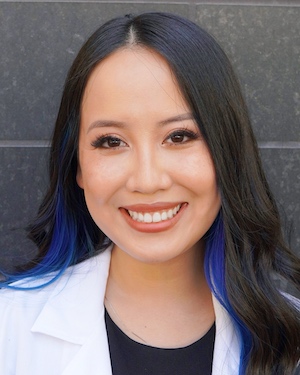
My Enemies Are After Me ⟩
March 2, 2022, by Teresa
Recently, I watched the stuff on Netflix about fraudsters and all I could think was “Wow, what I wouldn’t give to have their confidence.” Not to get anyone to send me $50,000, but because sometimes, it does feel like my enemies are after me . . . and by ‘my enemies,’ I mean the little voice in my head otherwise known as the “imposter.”
I felt like the biggest imposter ever when I was applying to OT school and when I started this program. If I had to rate my imposter syndrome on a scale of 0 (none) to 10 (worst) around this time, I’d put it at a 10. It was exacerbated both by being waitlisted and being fully remote. As I read the student ambassadors’ blogs, started meeting my classmates on Zoom, and learned from our amazing professors, I was simultaneously romanticizing this image of them in my head – that everyone else was so incredible and had it all figured out while I knew I always felt lost. I’d say I felt this way intermittently throughout my entire first year in the program.
In the past year, it’s resolved a lot. After 12 weeks of level 2 fieldwork, I felt my confidence increase as my competency in skills grew. Once we fully returned to campus last semester, I was comforted by hushed whispers from my peers who shared my confusion during classes. And then came two pivotal experiences this semester which mitigated my imposter syndrome significantly:
- An esteemed faculty member spoke to our class and shared that she still experiences imposter syndrome. That was just mind-blowing to me. There . . . was simply . . . no way? Not with all her achievements, success, and publications. Anyways, in OT, we love evidence-based practice, right? This individual urged us to search in our own history for evidence that we are indeed imposters in order to support the voice telling us we’re not good enough, don’t belong, or not ready for something. Here’s the punch line — you won’t find anything. You’re here at USC, doing the thing you set out to do, against all odds that might have stood in your way. The evidence speaks for itself.
- I heard this advice when I needed it most because it came at a time when I felt like other people were doing the romanticizing thing to me which I had been guilty of doing to others in the past. I had never seen myself as someone worthy enough to be looked up to, so to be placed in those situations felt . . . weird. Anyone who knows me knows that words of affirmation make me uncomfortable, which is something I am actively working on receiving better because it’s not me rejecting kind words, it’s the imposter. I want to see myself the way others see I have the potential to be, not in the distorted way the imposter tries to convince me of.
Going back to the baseline established at the start of this blog (which – you guessed it – we LOVE in OT), I’d say I now teeter around maybe 2 or 3. I entered “imposter” into the search bar on our website out of curiosity to see how I should frame this blog post and it returned ten blog hits from ambassadors past and present. They each approach it from a different perspective, which shows how pervasive imposter syndrome can be when you find yourself in a new or different environment that you’re not used to. But I think this also means you’re putting yourself in situations that challenge you to learn things you didn’t know before, experience growth throughout your life, and continue to prove people wrong, including that imposter telling you you’re a fraud. Sometimes, I hope I never rate my imposter syndrome at a 0 out of fear that it will indicate I’ve reached a threshold in my learning. Anyways, what I’m trying to say is you aren’t alone in this feeling. It can be difficult, but try not to compare yourself and your journey to others because we are only able to see what they choose to present to the world. Just give it some time. Both your confidence and competence will increase and with that, maybe you’ll learn to befriend your ‘enemies.’
⋯

You’re Welcome ⟩
February 26, 2022, by Silvia
Admissions Diversity First-Gen
I say that in the most humble way.
Here’s the thing about being first-gen — or maybe just about me — we’ve been conditioned to feel and express nothing but thankfulness when we’re given anything (an opportunity, admissions acceptance, a scholarship, etc.), rather than saying what we truly know.
“That’s right, I EARNED that, and I DESERVE it. You didn’t just HAND it to me . . . and if we’re being honest, you kinda need me.” Try saying that with your chest next time . . . maybe after you say thank you — but you get what I mean.
As I write this blog, I find myself deleting and rephrasing because I think to myself, “other college students feel that way too,” and that’s the problem. We minimize and sometimes dismiss our feelings trying to be considerate of others. All the typical college student feelz are valid, I am not trying to take that away. What I am saying is that they are compounded by being first-gen — that’s the power of intersectionality.
I don’t just exist as a student. I exist as the first-born and female daughter of Mexican parents — parents who brought me with them when they immigrated so that I could be “first-generation,” though I don’t think that’s what they intended. Mi mamá me dice, “Yo nunca imaginé que ibas a llegar hasta aquí,” and it’s not because she didn’t believe in me, she believes in me more than I believe in myself, it’s because we come from having nothing and knowing nothing. This matters because while many of my peers were enrolled in extracurriculars, sports, being tutored, etc., in the years preceding college applications, I was cleaning houses with my mom. The moment I learned to write and speak English, which was in 3rd grade, I was making my mom’s business cards on a 3x5 piece of paper and answering the phone when people called to inquire about her services. I cleaned houses with my mom from elementary to high school, up until I left for college.
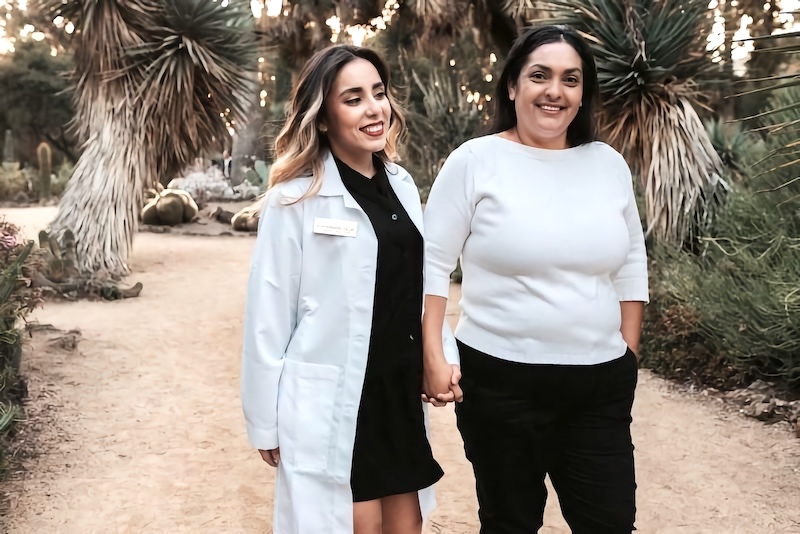
My mother’s daughter, a proud moment.
I, like many of my fellow Latinx and first-gen brothers and sisters, had romanticized going to college and couldn’t wait to experience it. The truth is, experiencing college as a first-gen student is rewarding, but it’s even more exhausting. There’s pride and there’s guilt. We’re not just navigating academics and figuring out financial aid, we’re also simultaneously carrying out roles as our families’ primary interpreters, therapists, mediators, advocates, coparents (IYKYK) and so much more. There’s pride in knowing my siblings get to wear sweaters with the names of universities they actually know about and have visited. The pride in knowing that when teachers ask if said university is where they plan to attend, they get to say, “No. My sister went there for undergrad. She’s at USC getting her master’s now,” is one of the many things being first-gen is all about. That, and the guilt that comes with it as we realize that this is only possible because our parents sacrificed their own dreams for ours.
I believe this is where the internalized superlative feelings of thankfulness stem from. Looking back to where we started, we can’t help but feel thankful for where we are now. But we’re not here because we paid our way in. I will always be thankful for every opportunity I have been given, but I will also acknowledge that it’s not a favor that is being done. Just as I remind myself that I worked for this, and I deserve it, I hope you do too.
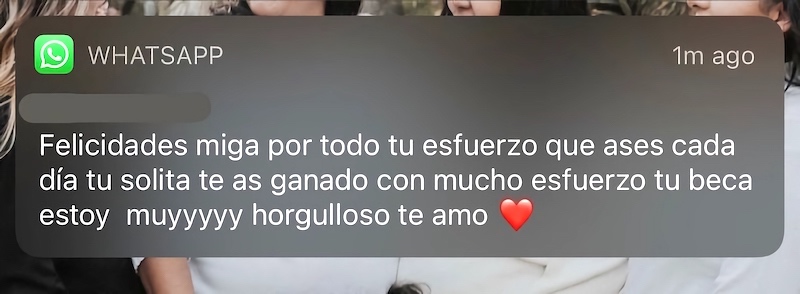
A reminder from my dad: “Congratulations mija for all of the hard work you put in each day. You, by yourself, with all of your effort have won your scholarship. I am very proud. I love you.”
So, to our alma matters (and future ones too, including USC), you’re welcome for choosing you. You’re welcome for our diversity, authenticity, and everything we have brought to the table.
—
I want to leave you with something that I was told and that I hold onto as I reflect on my journey through higher education: “You had nothing, but at the same time you had it all.” — Dr. Rafeedie
⋯
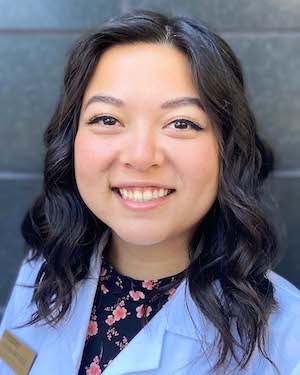
Why the OTD is Right for Me ⟩
February 18, 2022, by Alyssa
Admissions
Hello! At the time I’m posting this, many of you are likely hearing back from OT schools and deciding where you want to go. If so, congratulations! And welcome to the best career ever.
In the spirit of USC Chan admitting its first-ever class to the new entry-level OTD program, I wanted to share more about why I’m choosing to stay to get my OTD here even though I’m part of the entry-level MA program.
USC was the only entry-level MA program I applied to - the rest were all entry-OTD. Given that I already had a master’s, I figured the next obvious step was to pursue a doctorate, and I didn’t think through the distinction more than that. So when I accepted my offer at USC, I had practically already decided that it was going to be a 3-year commitment.
Now that I am at the end of the MA program here, I’ve done more reflecting on what the OTD means to me and why I think it’s important for my career –
1. Mentorship
My biggest draw to pursuing my OTD is an additional year of mentorship in a clinical setting. Sure, by the end of this year I will have technically completed all of the requirements to start practicing, but I think that the unique structure of an OTD compared to a first year on the job provides more opportunity for guidance and relationship building with your supervisor.
2. Leadership
The OTD also aligns with my interests in leadership roles within the profession. A guest speaker in class mentioned that sometimes a doctorate is required to have a seat at the metaphorical and/or physical decision-making table in some organizations, and I want to be there.
3. Timing
I feel lucky to be able to continue on to getting my OTD now rather than returning after a few years of work. Right now, my role as a student defines many aspects of my life, and I am feeling progressively more ready to close this chapter. Of course I’ll still be learning every day at work from my future colleagues and clients, but I don’t think starting work then returning for another degree would have worked for me.
As a bonus, staying for the OTD means spending another year in close connection with the wonderful friends and professors I’ve built relationships with here in LA 😊
⋯





